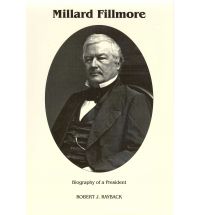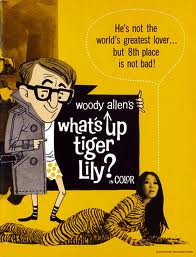Millard Fillmore: Biography of a President by Robert Rayback (1992). Recommended.
The Thirteenth President. Another succeeding vice-president who did not win an election, like John Tyler before him and Gerry Ford after.
Famous for: Maynard G. Krebs referred to him as Fillard Millmore to the repeated and visible annoyance of Mr. Promfritt, and he was also mentioned in ‘What’s up, Tiger Lily (1966)?‘ Students of Cultural Studies will grok these references; others will turn to Wikipedia.

Though Fillmore was anti-slavery he was intimidated by the magnitude of freeing seven million slaves and hoped for a gradual method and so did nothing. In an effort to maintain its North-South axis to make it a national party, the Whig party in 1848 capitalized on Zachary Taylor’s fame as a successful General from that era’s invasion of Mexico. Taylor was a Louisiana slaveholder. To balance the geography and the position on slavery, Fillmore agreed to join the ticket as a New Yorker who was anti-slavery but not an abolitionist.
Taylor treated Fillmore as every vice-president was treated. Ignored him entirely. Then Taylor took ill after a year and four months in office and died. Overnight Fillmore became president.
He had served in the New York state legislature, he had served three separate terms in the House of Representatives in Washington D.C., and he had been comptroller (chief financial officer) of the state of New York. He brought to the Presidency long experience of finance which he was good at, patience at working with committees, and a national outlook born of his long association with the Erie Canal and commerce along the shores of the Great Lakes.
The burning issue of the age was the existence, perpetuation, extension, or extinction of slavery, and its evil twin the tariff, which the South felt taxed it for public improvements in the North. The admission of new territories and states in the West was the kindling for these issues. Why? The addition of new senators would disrupt the balance of power in that body.
Fillmore supported, defended, and executed the Compromise of 1850 as a way to reduce the flames of insurrection, civil war, rebellion, invasion, riot, and the like. That meant enforcing the draconian fugitive slave law. Just as no state can decide which laws to obey and which to ignore, neither could a citizen, let alone the first magistrate, decide which laws to obey and which to ignore, despite his personal feelings, he reasoned.
As president he promoted industry, innovation, commerce, and business in the hope that national prosperity would lessen the heat in the extremities of the body politic. He encouraged trade with China and Japan and supported a railroad and then a canal across Central America to speed trade with the Orient. He warned first the French and then the British off Hawaii.
The aspirins of commerce did reduce some of the fever pitch but the effects soon dissipated. In 1852 one of the architects of the Compromise of 1850 proposed scrapping it, namely that Little Giant from Illinois Stephen Douglas. Go figure! All the old grievances and animosities re-emerged as if preserved in amber with every details in place. Nothing forgotten; nothing forgiven.
Should Fillmore seek the Whig nomination for another term in 1852? He dithered like a Libra though he was born a decisive, if lazy, Sagittarius. In the end Winfield Scott was the Whig nominee and was trounced by the Democrat Franklin Pierce.
Fillmore went into retirement in Buffalo, but his wife died within a month of leaving Washington DC and his only child, a daughter, a few months later. Thus at a loss he travelled through Europe and Asia, and flirted with re-entry politics.
By 1856 the Whig party was moribund and Fillmore joined the American Party, the political front of the Know-Nothing Movement [think Tea Party] and the rabid anti-Catholicism which was a reaction to the tidal waves of immigration occurring in East coast cities like Boston, Philadelphia, Hartford, Brooklyn, New Bedford, Providence, Trenton, Baltimore, Wilmington, Charleston, New York, and more. It was also anti-black. His vice-presidential running mate was Andrew Jackson Donelson, a nephew of Andrew Jackson. Fillmore evidently thought he could tame these nut cases [think John McCain] and discovered he could not [ditto John McCain]. He came a distant third to James Buchanan and John Frémont. His vote made no difference to the outcome.
That ended his political career. He made another European trip and was much feted as a former president, crossing paths with The Little Magician, Martin van Buren, who was in Europe. Fillmore returned to Buffalo and in time re-married and became a man for local good works. He was on every committee for a hospital, a school, an orphanage, a library, a bridge, a hard road, a railway crossing, a sewer line, a pier on the Erie Canal, and the University of Buffalo where he served as Chancellor raising funds for many years. Many of these committees met in his home and he was the real and titular chairman of many. How many ex-presidents have done as much tangible good, I dare not ask.
Though he disliked Republicans for happily embracing a Northern only party (Lincoln got not a single electoral vote in the South and no popular votes beyond Maryland and Kentucky) which he feared would, as it did, lead to civil war. Once the civil war came he organized a home guard of the superannuated and paid for its uniforms. There were recurrent rumours from the outset of the Civil War that Great Britain would intervene from Canada to revenge itself on the United States and so this guard was as much a message to British officials in Canada as to Confederates.
At war’s end, he advocated moderation toward the defeated South but his voice was no longer heard.
Despite those wits Woody Allen and Maynard G. Krebs, Fillmore did a great deal of good first by holding the union together in peace for his term, and then materially in his home town of Buffalo. His name is found on many schools, hospitals, bridges, and the like. A honour that has so far escaped Mr. Krebs. Of Mr. Allen, I (prefer to) know not.

The book is well documented. When an assertion is made there is a reference to a source. The first hundred pages or so are pretty dreary as it traces his origins and early life, but the prose sharpens as his political career unfolds. The last third of the book offers some well judged observations and striking turns of the phrase.
It is part of series but does not read like a completed template the way the presidential biographies read in the series edited by Arthur Schlesinger, Junior. Rayback was professor of history at Syracuse University when the book was published.
Skip to content
